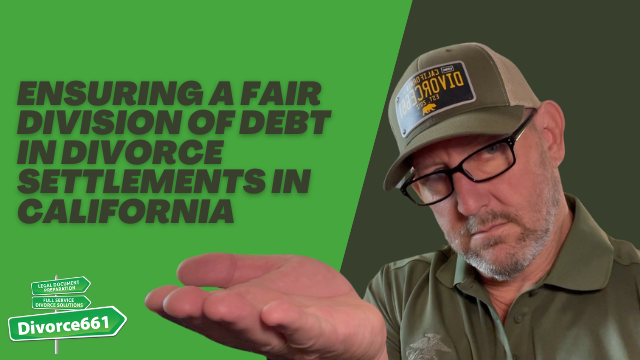Ensuring a Fair Division of Debt in Divorce Settlements in California
Divorce isn’t just about splitting assets; the division of debt is equally crucial, especially in California. Many couples focus on the tangible assets, but overlooking debts can lead to unexpected financial burdens. Understanding how debts are classified and divided can save you from being stuck with debts that aren’t rightfully yours.
Understanding Community Debt in California
In California, the law treats debts incurred during the marriage as community property, meaning they are typically split 50/50. This is true even if only one spouse’s name appears on the account. Imagine the shock of discovering that a debt you knew nothing about is now partially your responsibility! This scenario is more common than you might think.
It’s important to recognize that not all debts are shared equally. Debts incurred after separation or loans that did not benefit the marriage can be assigned to just one spouse. Knowing these exceptions is crucial for protecting your financial future.
Exceptions to Community Debt
Let’s dive deeper into the exceptions. If a loan was taken out post-separation and did not benefit the marriage, the court might assign it solely to the spouse who took it out. This distinction is vital for ensuring fair debt division.
For instance, a client of ours faced a situation where their ex-partner secretly took out a loan after moving out. By documenting the timeline and filing it with the court, we successfully argued that the debt was separate. This case underscores the importance of meticulous recordkeeping. Proper documentation can make all the difference in protecting your financial interests.
Documenting Financial Moves
Keeping track of every financial move is essential. By documenting your financial activities, you create a timeline that can be crucial in court. This practice not only helps clarify your position but also serves as evidence if disputes arise.
At Divorce661, we specialize in listing and classifying all debts accurately. We draft clear, enforceable agreements to ensure fair division and include timelines for paying off or refinancing joint accounts. This proactive approach is designed to protect your credit and financial future.
Handling Joint Credit Cards and Loans
Joint credit cards, car loans, and personal loans can complicate debt division. When it comes to joint accounts, both parties are typically responsible for the debt accrued. To avoid complications, you might consider transferring balances to individual accounts or paying off debts before the divorce is finalized.
For example, if one spouse will continue living in the marital home, it’s advisable to refinance the mortgage in their name only as soon as possible. This minimizes the risk of future disputes over shared debts.
Real Client Stories
We’ve helped numerous clients navigate the complexities of debt division. One notable case involved a client whose ex took out a loan without their knowledge after they had separated. With clear documentation of the timeline, we presented the evidence, and the court ruled the debt as separate. This not only protected our client’s financial future but also highlighted the importance of thorough recordkeeping.
The Role of Timelines in Debt Division
Timelines play a crucial role in debt division. Understanding when a debt was incurred can determine whether it is community or separate property. In California, the date of separation is particularly significant. Once a couple agrees that the marriage is over, they begin acquiring separate debts.
However, establishing the date of separation can be complicated. It’s not always the day one spouse moves out or the day divorce papers are filed. Instead, it’s when one spouse clearly communicates their intention to dissolve the marriage, and their actions reflect that intention.
Protecting Your Credit
Divorce can have lasting effects on your credit, especially if debts are not divided properly. By understanding how debt division works, you can safeguard your financial future. Our team at Divorce661 is dedicated to helping clients avoid future credit issues linked to their ex-spouses.
We assist our clients in drafting clear debt division terms, including refinancing requirements, to ensure that everyone knows their responsibilities moving forward. This clarity can prevent misunderstandings and disputes later on.
Why Choose Divorce661?
Choosing the right partner to navigate your divorce can make all the difference. At Divorce661, we focus on creating a comprehensive strategy for our clients. Our approach includes:
- Listing and Classifying Debts: We ensure all debts are accurately documented and categorized.
- Drafting Clear Agreements: Our team drafts enforceable agreements that clarify debt responsibilities.
- Protecting Your Credit: We help you avoid future credit issues by ensuring debts are divided fairly.
Final Thoughts
Dividing debt in a divorce is just as important as dividing assets. By understanding the intricacies of California’s community property laws, you can protect yourself from unfair financial burdens. If you’re concerned about being stuck with your ex’s debt, don’t hesitate to reach out for help.
Visit Divorce661.com for a free consultation. Together, we’ll ensure your debts are divided fairly and legally, safeguarding your financial future and peace of mind.

